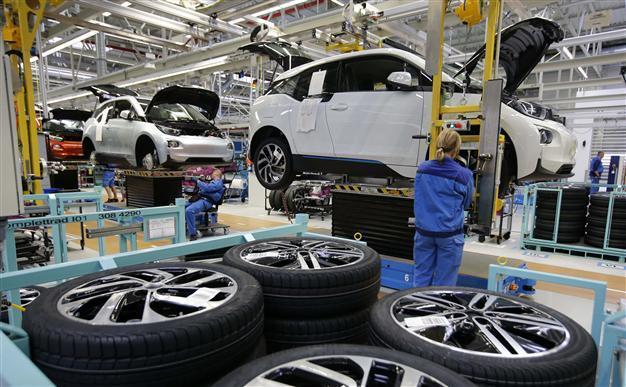Eurozone business activity gathers pace in September
LONDON/BEIJING - Reuters

Markit’s Flash Composite Purchasing Managers’ Index (PMI) in the eurozone jumped to 52.1 from last month’s 51.5, its highest since June 2011 and above expectations for 51.9. REUTERS photo
Business activity in the eurozone has grown faster than expected this month as new orders flood in at their fastest pace in over two years, surveys showed on yesterday, adding to signs that the economy is healing.
The surveys suggest the region’s economic recovery was becoming more broad-based with growth in both Germany and France, the bloc’s two largest economies.
Markit’s Flash Composite Purchasing Managers’ Index (PMI) jumped to 52.1 from last month’s 51.5, its highest since June 2011 and beating expectations for 51.9.
The pace of growth in the bloc’s dominant services sector beat all forecasts in a Reuters poll. The PMI came in at 52.1, well ahead of August’s 50.7 and comfortably above median expectations for a more modest rise to 51.0.
A reading above 50 indicates growth. “These surveys show a real underlying swell of improvement. It’s all looking very positive,” said Chris Williamson, chief economist at Markit.
Businesses in Germany, Europe’s largest economy, expanded at a faster pace than last month and in France, the bloc’s second biggest economy, activity increased - albeit marginally - for the first time in 19 months.
New business in the bloc increased again this month, according to the composite subindex, which rose to 51.6 from 51.0, pushing business expectations among services firms to an 18-month high.
Williamson said the composite PMI, which surveys thousands of companies across the region and is seen as a good guide to economic growth, pointed to a 0.2 percent expansion this quarter, matching a Reuters poll taken earlier this month.
“Although there are still risks to the eurozone economy, there’s certainly nothing here to suggest any chance of a return to recession soon,” Williamson said.
Manufacturing activity eased this month but firms were able to pass on rising input costs to customers. The PMI dipped to 51.1 from August’s 26-month high of 51.4. A sub-index measuring output fell to 52.1 from 53.4.
Inflation fell to 1.3 percent in August, well below the European Central Bank’s target of close to but below 2 percent, warranting the bank’s pledge to keep interest rates at current levels or lower for an extended period of time to help the recovery.
China’s PMI at fastest pace in six monthsMeanwhile, China’s factory sector grew at its fastest pace in six months in September, a preliminary survey showed yesterday, adding momentum to a tentative turnaround in the world’s second-largest economy since the middle of the year.
The earliest reading of China’s economic performance in September reinforced confidence the government could meet its growth target for this year, and boosted Asian stocks as investors hoped it was a precursor of more goods news.
The flash HSBC Purchasing Managers’ Index (PMI) climbed to 51.2 from August’s 50.1, hitting a high not seen since March, with 10 of 11 sub-indices rising in September.
“Given the current growth momentum, the Chinese government should be able to achieve its 7.5 percent growth target,” said Ting Lu, an economist at Bank of America-Merrill Lynch.
Encouragingly, domestic demand also showed resilience, with new orders rising to a five-month high.
